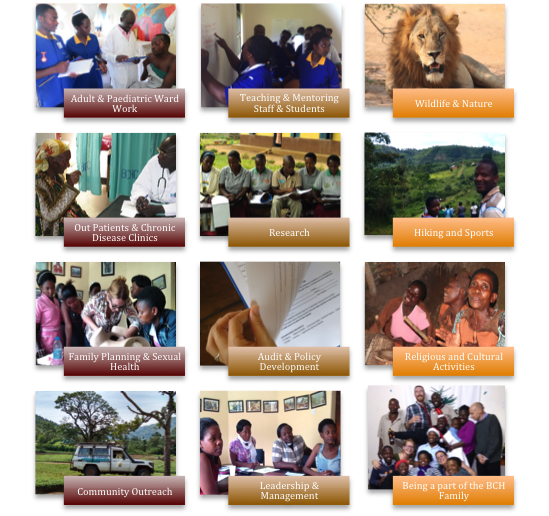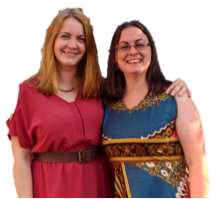Wanted: GPs for Remote Rural Hospital in Uganda…
Living in Liverpool and Sheffield, never having met, we were two recently qualified GPs, already feeling jaded with clinical practice in the UK. We were both searching to find an overseas long term placement that would allow us to combine direct clinical care with capacity building for local staff and systems. We were looking for somewhere that was well supported, where we would not be forced to work in situations beyond our clinical capacity but where we would still be challenged and our specific skillsets would be valuable. In fact our whole careers had been leading up to this moment: becoming general practitioners, ensuring rotations in women’s health, paediatrics and emergency medicine, undertaking the Diploma of Tropical Medicine, previous shorter stints volunteering overseas and engaging with activities to develop our education, leadership and management capacities.
Separately we both began to do the circuits of global health courses and conferences, sifting through placements offered by various NGOs and scouring the back pages of journals. Then we found it: a job at Bwindi Community Hospital (BCH) in South West Uganda advertised via the Royal College of General Practitioner’s (RCGP) Junior International Committee.
We sent in our CVs and passionate covering letters and were shortlisted for interview via Skype, conducted by RCGP and management from BCH in Uganda. On Christmas Eve 2014 we both got the call we had been waiting for: we were going to Uganda in August 2015, for a year in the Bwindi Impenetrable Forest, home of the rare and beautiful mountain Gorilla.
Overview
Our year in Bwindi thus far has been both challenging and rewarding in equal measure. We are thrilled to report that Ceri has decided to stay on for another year which we feel will be of enormous benefit for the continuity of some of the many projects and initiatives we are working on including the THET funded
USHAPE Family Planning Training Project. She will soon be joined by Leo, who will be replacing me and who I am sure will be welcomed into the Bwindi Community warmly and fully as have I. For those who don’t know about our life and work here in Uganda here is a brief summary:
Clinical
- Adult in patients
- Out patient clincs
- Emergencies
- Paediatrics cross cover
Non-clinical
- Audit and quality improvement
- Research
- Departmental management
- Teaching and mentoring
Social
- Hiking and exploring
- Playing sports such as netball, football and volleyball
- Joining the hospital choir
- Attending weddings and social functions
- Hosting parties
- Attending religious activities
- Visiting the tourist lodges to publicise the hospital or simply relax and have a beer
Whilst we are here we are able to develop further our skills in:
- Leadership
- Mentoring
- Teaching
- Intercultural Communication
- Clinical Diagnostics
- Tropical Medicine
- Resource Management
- Service Development
- Team Building
- Research & Audit
- Quality Improvement
- Change Management

Activities undertaken by RCGP Volunteers at Bwindi (clinical, non-clinical and social)
On a personal note
My time is coming to and end in just a few short months I have begun to reflect on the challenges and rewards and consider where best to focus my efforts in these final weeks.
Managing your own expectations for what is desirable, acceptable and/or feasible for providing clinical care in this remote context is always the toughest challenge. Continually evaluating your decision making process in the context of local culture, resources and skill sets is a daily reflective requirement. It is not uncommon to feel frustrated when things will not or can not proceed, either clinically or organisationally, as you would wish.
Drugs or tests may not be available or may not be affordable for your patients, skills or attitudes that you would desire your team to have may be too complex or simply not culturally relevant. These frustrations can be tackled however and I think there are some key lessons I have learned (universal I think and not only unique to our specific circumstance):
1) Build Rapport and Team Spirit: The thing that gets me through a tough day is the strong relationships we have with our nursing team on the adult ward and outpatient department. This is fostered through making sure we spend quality social time together, by sharing food and laughter outside of our clinical working environment and creating a sense of identity and community within the department. We have a running theme on AIP that we are striving to be the best ward ever and this is emphasised through regular constructive feedback, showing appreciation for work well done and even having our ward computer passwords as various versions of the phrase “Best Ward Ever”

2) Build Trust and Respect: Not only do we have a sense of team spirit with our team, but we also work hard to earn their trust and show them respect. They have countless knowledge and skills that we do not, particularly in the application of local context (cultural, resource, disease burden etc). After every patient review and ward round we stop and ask ” Is there anything else that you feel we should or shouldn’t be doing?” It is also important to recognise that listening should be active and take into account non-verbal cues, which are easy to misunderstand in different cultural contexts. When we see a facial expression on a team member that we do not understand the meaning of we try to explore what message and meaning they are trying to convey and how can we address their concerns or ideas. We try to practice openly and honestly with all the teams opinions taken into account. If they feel unsure about a task or are struggling to implement a clinical objective we will explore why and how they think we can resolve the situation or adjust the plan to suit their skills and working practices.
3) Don’t bury your head in the sand: It is easy to feel overwhelmed and to back away from raising concerns for want of an easier life. But this rarely leads to any improvement or development. It is important to tactfully but clearly raise issues of concern and facilitate problem solving processes with local staff.
4) (conversely) Don’t be confrontational: This might be the hardest one for me to follow personally, but whilst you should indeed raise concerns and tackle problems it is important to do so calmly, patiently and constructively. You are often coming up against deeply ingrained misconceptions or cultural behaviours that will not respond well to brute force. It takes slow, subtle, integrated, gradual development for change to be sustainable and pushing the issue to hard can actually serve to produce a reflexive backlash that may only make the problem worse.
I have written some more reflections on the lessons I have learned here:
Related




1 comment
Thanks Claire for sharing your experience with us. I trust yours can be a road map for others who seek to volunteer as well.